EBR charges a service fee to manufacturers to produce ebike reviews, this began in 2018. It’s the same flat fee for each bike, and it helps us to keep the site going while limiting ad clutter. We appreciate the opportunity to serve you with our opinions and data but respect your right to know that we were receive compensation. In Canada, where EBR is based, it’s also a legal requirement to let you know this :D
The E-Lux Sierra is a folding fat bike with all the fixins. Before we even get into the specs, I want to call out the six (possibly eight) color choices that the company offers. It’s unique to find a relatively affordable ebike that comes with options like this. My personal favorite is silver, because it shows up more easily at night, improving safety. With custom steel fenders, an integrated backlight, rear rack with pannier hangers, and optional front rack, the Sierra is feature rich. It will keep you dry and clean, haul your gear comfortably, and keep you relatively comfortable. Fat tire bicycles tend to be stable and less jarring than traditional bikes because of the increased air volume in a 4″ tire verses a ~2″ tire. They are wide and can be set to a wide range of pressure options, from 5 PSI to 30 PSI in this case. The lowest pressure setting is optimal for snow, soft dirt or mulch forested terrain, or even sand. I have tested ebikes similar to this one on California and Mexican beaches, and you can see the results in this video. Folding electric bikes have smaller tires, 20″ diameter in this case, which means lower air volume and a higher attack angle. They aren’t as comfortable as full sized tires but tend to weigh less and take up much less space for portability. E-Lux opted for nicer Kenda tires, with big grippy knobs, but the rims aren’t punched out (which would reduce weight slightly). I love that they specified black rims, spokes, and hubs, including the hub motor itself. The bike looks great with this sort of attention to detail really paying off. Notice the black seat post, stem, handlebar, and racks. The kickstand is positioned out of the way, towards the back of the bike, so it won’t get kicked while pedaling or cause pedal lock if left down. The chainring has a plastic guide built on, which reduces snags and marks on pants when pedaling while simultaneously preventing chain drops on rough terrain. Sam and I rode this bike on an empty gravel lot in Fullerton, California, and you can see the chain bouncing wildly as we sped along at 20+ mph. We had ridden over on paved streets, opting for a higher tire pressure to make the ride efficient… but on the bumpy lot, the bike bounced around quite a bit. It would have been better to lower the tire pressure for those off-road shots, but I was impressed with how well the chain stayed on and it gave me a feel for noise. The fenders felt solid and aside from the motor whirring, I felt like the bike stayed pretty quiet. The Sierra only comes in one frame size, but the seat post and handlebars offer adjustable height. Don’t go too high on the stem, because it can stretch the cables when you turn. The cables aren’t threaded, and can disconnect more easily in this type of situation.
Driving the bike is a 500 watt nominal, up to 750 watt peak, planetary geared hub motor from Bafang. It’s specifically designed for fat bike rims, which tend to be wider and benefit from a wider spoke bracing angle and starting point. For offering so much power, the hub motor isn’t especially large or heavy. It hides nicely between the basic 7-speed cassette on the right and large 180mm disc brake rotor on the left. Powerful brakes are a good thing to have when your ebike weighs ~60lbs and can top 20 mph. Both brake rotors are 180mm vs. many competing products that slip by with 160mm. These are mechanical disc brakes vs. hydraulic, so the cables will stretch and could get gunked up with sand and water over time. Both brake levers have motor inhibitors, to cut power to the drive system instantly when pulled, and the left lever has a really nice integrated bell… that I love. Activating the motor is a 12-magnet cadence sensor that’s sealed in a compact unit, mounted to the left side of the bottom bracket. Most older products, and some cheaper current generation products, use a larger disc with visible magnets that can get bumped around and gunked up. For a fat bike like this, which might be driven in snow, sand, and mud, it’s nice to see a sealed sensor. You also get a variable speed trigger throttle that can be activated in any level of assist, 0-5, from standstill. It’s a wonderful tool for those difficult starts in soft terrain or when you have to get off and walk the bike up a steep or rocky section of trail. Basically, the bike can pull itself through difficult patches and help you to balance while pushing. My friend Sam was talking about use cases like hunting, where you’d bring a product like this in the back of a truck or SUV and then load your gear to get way back into the woods without creating as much noise or smell to alert animals. His other example was surfing, how this electric bike could be used in combination with a bicycle mounted surf rack to help you reach untouched breaks. It sounds like he has sold this exact product to some surfers who ride the different sections of Trestles in Southern California. This brings up an interesting point though, with steel fenders and fork, there is a potential for any scratches to rust over time.
Powering this bike is a 48 volt 10.5 amp hour lithium-ion battery pack containing Samsung cells. The total capacity, 504 watt hours, is slightly above average for this generation of electric bikes and above average for most folding ebikes I’ve reviewed. What really sets it apart however, is that the pack is completely enclosed in the main section of frame. This adds protection, improves balance with the 5lbs of weight low and center on the frame, and looks good. The battery powers the backlit LCD display, the motor, the integrated rear light (which only has one LED and doesn’t use too much energy), and two full sized USB charging ports. One port is built into the left side of the battery pack itself, allowing you to use the pack as a portable power bank for picnics, camping, etc. and the other port is built into the base of the control pad, near the left grip. This charging port is useful for maintaining a smartphone for use with GPS, charging a headlight (since the bike only comes with a backlight), or powering a set of bike speakers. Very cool! For those who weigh more, are planning to ride through soft difficult terrain, climb frequently, or just rely on the zip and speed offered by the throttle, this battery pack is a good solution. It’s neat that you can charge the pack on or off the frame, that the USB port and physical on/off switch is reachable through the rubber cover that’s built into the frame, and that the charger is so light and portable. With the addition of a basic trunk bag for the rear rack, you’d have plenty of room for the 1.4lb charger and a water bottle… since the frame doesn’t have any bottle cage mounting points. I’ve been reviewing E-Lux products since 2015 and heard great things about the company from their dealers and directly from their employees. It sounds like the lead engineer used to work at Pedego, and the company offers a comprehensive year long warranty with local dealer and direct sales support through their website. My buddy Sam, who owns the Electric Bicycle Center in Fullerton, CA told me that he appreciates that E-Lux is local and trusts the brand.
Operating the Sierra takes a couple of steps, and has a few advanced features compared to most other folding products I’ve reviewed. You can begin by charging the battery, mounting and locking it in place in the downtube, then clicking the on/off toggle switch. Now, the LCD display panel is ready to be switched on, just hold the power button there for a couple of seconds and you will see it blink to life. This display is not removable, but can swivel a bit to reduce glare if you don’t over tighten the mount. You’ve got a current speed readout, 0-5 pedal assist level, battery charge level (with voltage readout), and timer. I appreciate how large the display itself is, and that you can tap the power button once to activate backlighting. This is useful for night rides, and it also activates the integrated backlight. The four buttons on the display are positioned within reach of the left grip and reach over the brake lever mount perfectly, so you aren’t really having to stretch or get distracted looking down. The + and – buttons are the two lowest items, and they have a physical rise that can be interpreted with touch as you get used to how the bike works. I personally love that the trigger throttle is active with full power, not mater which assist level is active. The upside is that you can always get quick help zipping across a street, getting through a tough section of trail or sand, and quickly catch up to friends or finish scaling a difficult hill without worrying about clicking extra buttons or changing gears. The smaller diameter of the wheels on this ebike provide a mechanical advantage to the motor, so it’s quite powerful and capable. When you add the seven pedal gears, the bike can take on most terrain. Even at ~23 mph, I was able to pedal comfortably and not feel left behind. The cassette range is a bit small at 14 to 28 tooth vs. 11 to 36 or 42 on nicer drivetrains, but it keeps the price down. Shifting gears is done independently of the drive system, so you won’t get mashing or strain like a mid-drive setup. The hub motor will work even if your chain breaks. To shift, you press up or in on the large thumb shifter, positioned near the right grip. This is not my favorite shifter, because it requires more dexterity and finger strength, but it works well for larger hands and gloved fingers, because the buttons are big. I’m guessing that E-Lux chose this shifter because it stays out of the way for the trigger throttle. Before moving on, I want to point out that you can change some trip stat readouts on this display by pressing the Set button and you can enter into the settings menu (to change units, adjust wheel size, and change power level) by holding Set. The three power options are Eco, Normal, and Power, which change how zippy the motor will feel. Eco will give you the best range, but accelerate slower.
All things considered, the E-Lux Sierra is a very impressive folding fat bike. This is a category that has grown in popularity because fat tires are fun and comfortable, and folding bike frames are portable! You get the best of both worlds and a ton of accessories here. The bike is comfortable because of the nice thick saddle, big tires, ergonomic grips, and adjustable stem… but stiff and somewhat light because the fork is rigid. I think the rigid fork also looks nice because it’s paint matched. For those who really want to dial in comfort, consider shopping around for a 31.6mm suspension seat post and use a shim to make it fit 31.8mm. I’m not sure why E-Lux didn’t just go with a 31.6mm post? And perhaps they’ve changed this… I’d check with them and measure your product (look for the stamp on the lower portion of the seat post to confirm). In the folded configuration, the bike was stable, but it doesn’t come with magnets or rubber straps to keep it folded. I’d suggest using adjustable plastic bungee cords and maybe a towel in between to reduce scratching. The main section of tubing on the bike is overbuilt for strength, but the folding joint is positioned near where you knees pass which could cause a bruise when mounting or pedaling. I’m speaking from experience with a different ebike, when my girlfriend and I were riding in sand and she had to hop off unexpectedly… ouch. E-Lux opted for extra thick spokes on this bike, 13 up front and 12 gauge in the rear, so I’m guessing that it could handle larger riders. The rack is rated to ~55lbs and has pannier hangers for use with more bag options. Child seats would probably require the Yepp Easyfit Adapter to work properly. I noticed that the chain appeared to have a rust resistant coating, which is nice if you ride near the beach or in snow. You can hose down most electric bicycles, but it’s best not to spray them with high pressure. The electronics are water resistant, but the wire connectors used for this specific bike are press fit vs. metal threaded with washers. In addition to the trigger throttle, the display also allows for walk mode if you hold the – button in. Note that my friend Sam, who did some test riding and burnouts in the video review above, is about 6’4″ and weighs ~230lbs but was able to zip along pretty good on the bike. Big thanks to Sam and E-Lux for partnering with me on this review. I welcome comments and feedback below or in the E-Lux ebike forums where you can share pictures and more detailed updates :D
Pros:
- Great utility here, the fat tires allow you to ride in many different environments, the chain guide should reduce drops on bumpy surfaces and keep your pant legs clean, and the included rear rack is sturdy and has pannier hangers… it’s cool that you can order a matching front rack too
- Safety is a big deal to me, so it’s neat that the bike is sold in many colors, including silver which is more visible in dark conditions, and that the bike comes with an integrated backlight that is mounted to the rack
- The display panel has a full sized USB type A port built into the base so you could power an aftermarket headlight like one of these, or charge your smartphone for music or GPS… the battery pack also has a USB port that could be used while riding or if you take the battery off for camping or a picnic, it’s great to have both of these options to tap into the high capacity battery
- I really liked the wide, paint-matched, metal fenders that come with this ebike, they look good and will keep you from getting dirty and wet… but they do add some weight and are made of steel, which can rust if scratched over time
- The kickstand offers some adjustability for length and is positioned far out of the way from the bottom bracket and left crank arm, E-Lux chose very well here
- The ergonomic grips, slightly thicker saddle, and large 4″ wide tires offer a good deal of comfort here, sometimes smaller folding bikes don’t feel as good because of the low air volume in the tires and higher attack angle of the smaller wheel size but this one felt great
- Excellent motor and battery integration here (both technically and visually), note the fat tire specific hub motor from Bafang that’s in a black casing and spoked in with black spokes, the battery is completely hidden in the downtube which offers protection and looks great
- Good battery power and size for a folding ebike, the roughly 500 watt hour pack is wired into a 48 volt system for more zip and is positioned low and center on the frame for optimal balance, it would be nice if the included charger were a bit faster than 2 amps, but this is fairly typical of value priced products
- For $1.6k, I feel that this electric bicycle offers a lot of style, comfort, and performance, I was amazed that it came with so many accessories and in six colors!
- The Kenda Krusade Sport tires used here are pretty nice and should last longer than Chao Yang or other off-brand products, you can lower the pressure all the way down to 5 PSI and ride this in sand or semi-packed snow, having a trigger throttle makes it much easier to get started in soft terrain vs. only pedal assist
- The Sierra folding fat bike only comes in one frame size, but the 350mm long seat post and telescoping height stem allow it to fit a wide range of body types, I’d call the frame itself a mid-step vs. low step
- Excellent stopping power here, the larger 180mm mechanical disc brakes provide a huge mechanical advantage over the smaller 20″ wheel size, mechanical can get gunked up with water, sand, dust etc. over time vs. hydraulic but cost less and are easier to service for most end users… I appreciate the motor inhibitors built in to both levers and the sturdy integrated bell on the left brake lever housing
- E-Lux opted for a nicer sealed cadence sensor at the bottom bracket, it contains 12 magnets and responds pretty quickly and naturally (though not as much as a torque sensor or multi-sensor), it’s nice that both brakes also have motor inhibitors to override
Cons:
- The $50 front rack option is neat and could work alright for small lightweight items, but it’s mounted to the fork and tips as you turn the bike, this could dump your cargo and will impact steering a bit
- The plastic wire housing below the main tube looks nice but didn’t seem as sturdy as internally routed cables or zip ties connected to metal tabs… the plastic channels kept coming off during the folding/unfolding process of this review
- Minor gripe, the big Shimano thumb shifter that they used here requires more reaching and hand/finger pressure to use than smaller triggers, but they do this to make room for the trigger throttle housing, so it makes sense and actually works well for people with larger hands or those wearing gloves
- The fork and fenders are made from steel, which is sturdy! but can rust over time as the bike is scratched and the paint is worn down, this may be happen more quickly with a portable folding ebike that could get laid on its side during transport
- The frame doesn’t have any magnets or rubber bands to keep the bike folded, this could lead to rattling and unfolding or make it trickier to lift because it could flop around, consider some adjustable bungee cords with plastic ends to keep it folded
- The optional front rack is a bit wide and will collide with the rear rack when folding, I suggest putting a towel or shirt between them to keep the paint looking nice, you can see this in the video around 18:44
- Plastic folding pedals tend to offer less grip and can sometimes flex when pedaling, especially if you’re a larger person, I’d consider swapping them out for rigid pedals or alloy folding pedals like these
- The E-Lux Sierra is heavier than most folding electric bikes at ~60lbs, which makes it trickier to lift and transport, but it’s not as heavy as I expected considering that it has metal fenders, a rack, and a high capacity battery
- Entry level Shimano Tourney derailleur with limited 14 to 28 tooth cassette, this is the starting point for derailleurs and cassettes that weighs a bit more, might need tuneups more frequently, and just doesn’t offer as much choice for pedaling (climbing or going fast), but it’s fine for a bike like this that is trying to be affordable, especially since the bike does have a throttle
- The motor power cable enters from the right side of the axle and sticks out a bit, this could lead to snags, bends, or other damage if the bike tips or is being transported in the folding position, just be careful with that part of the bike because the derailleur is also there and a little sensitive
Resources:
- Official Site: https://www.eluxbikes.com/
- More Pictures: https://photos.app.goo.gl/UeDDx5t3DqaKh1rh9

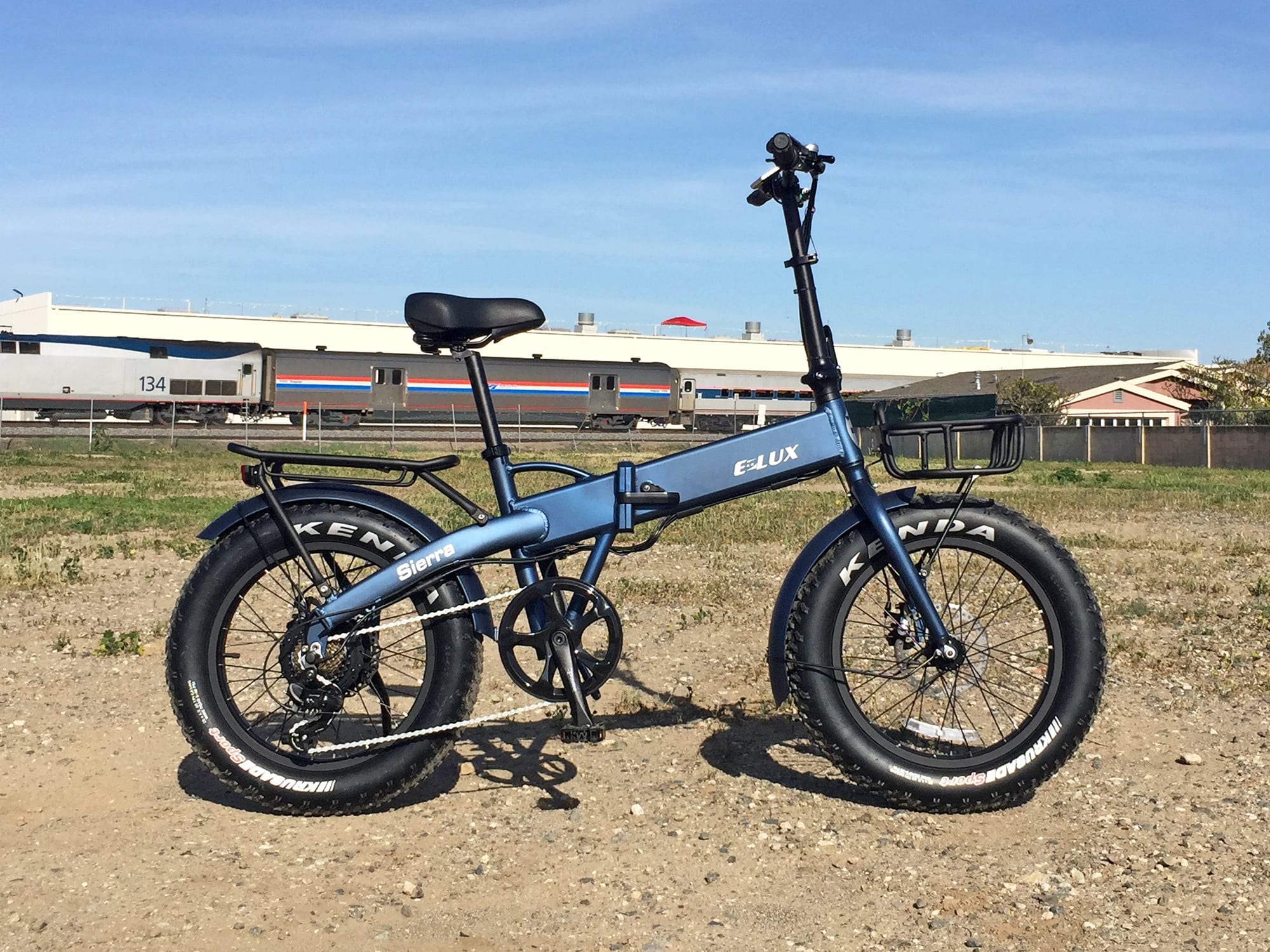
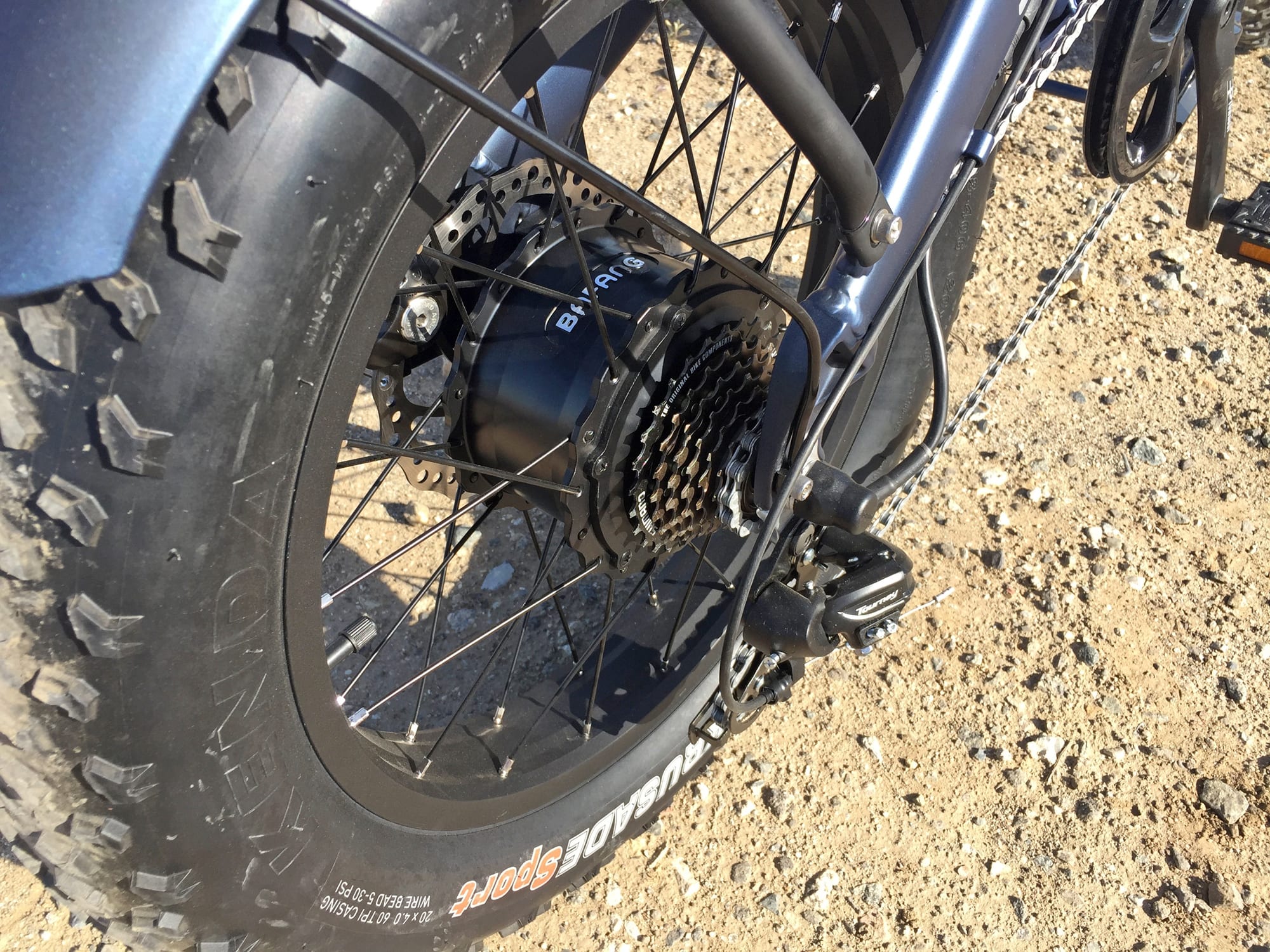
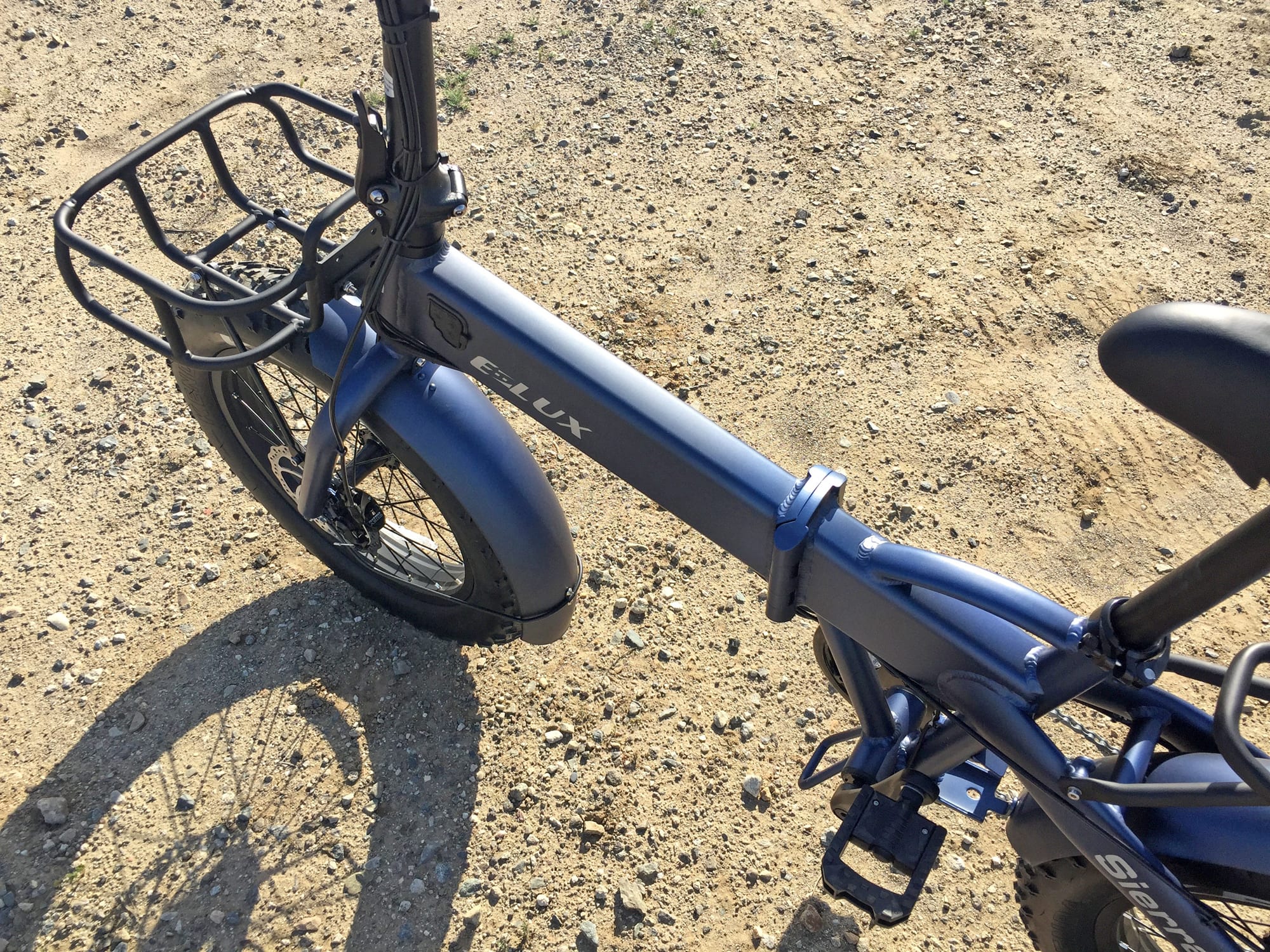
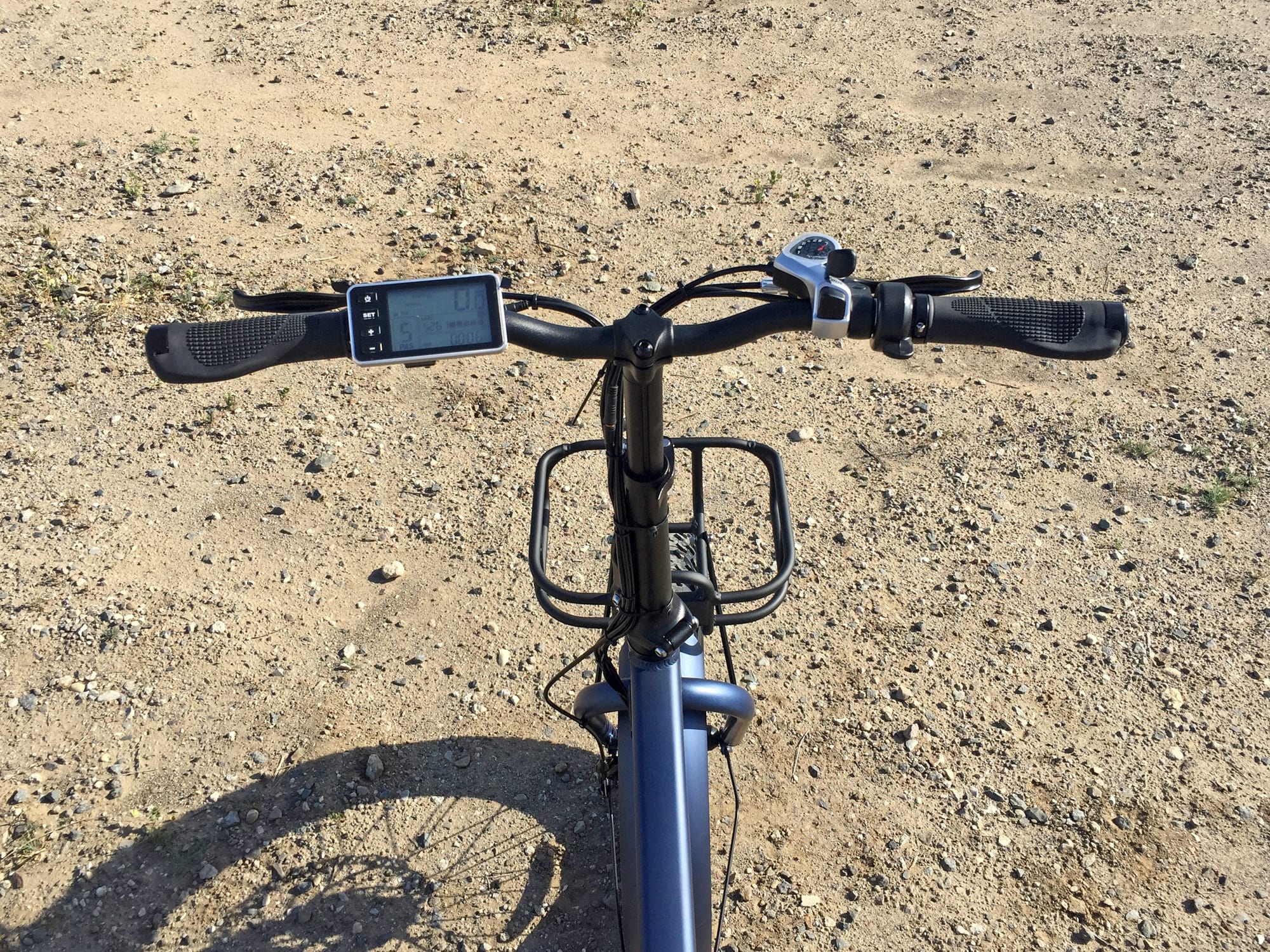
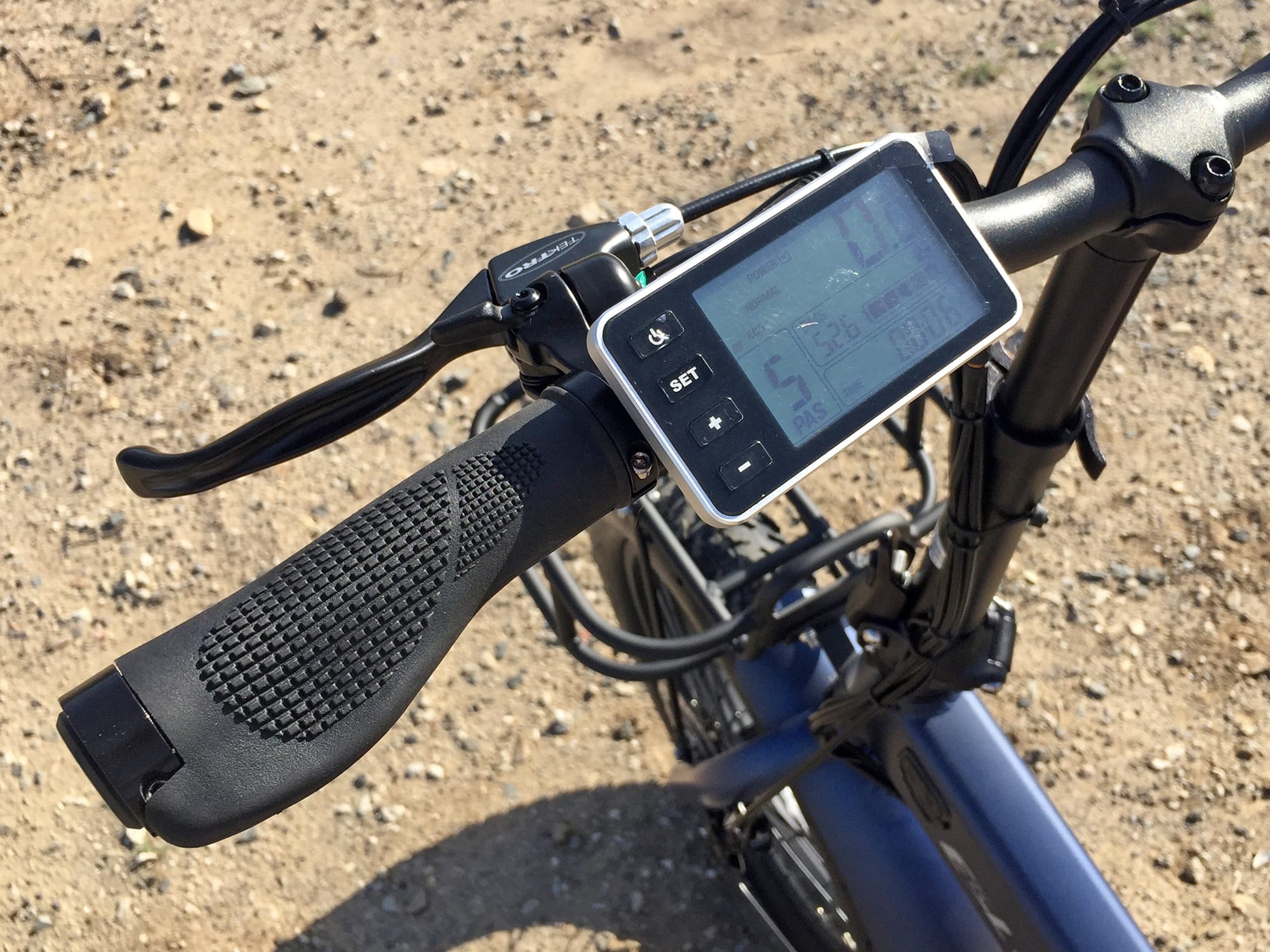
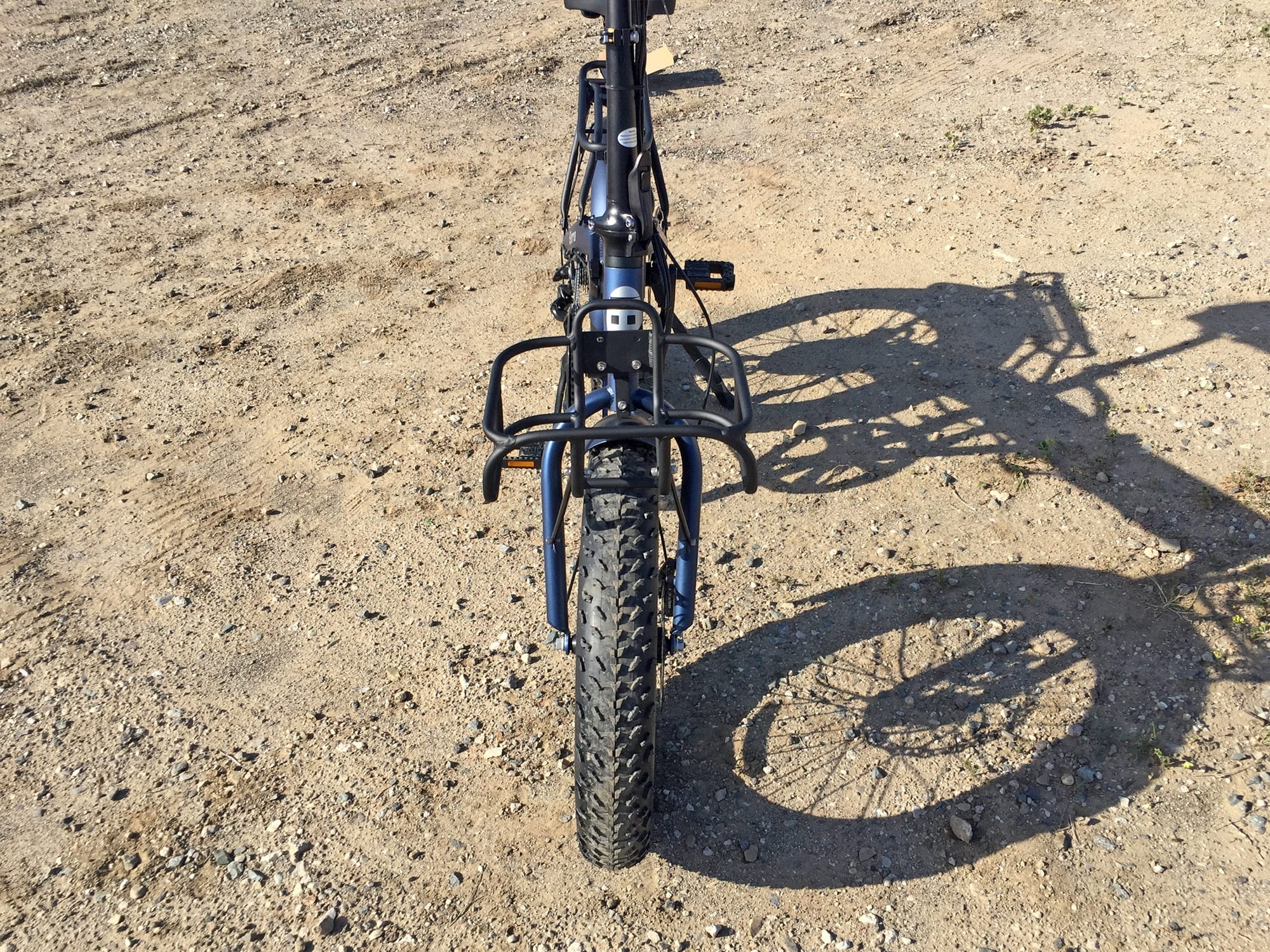
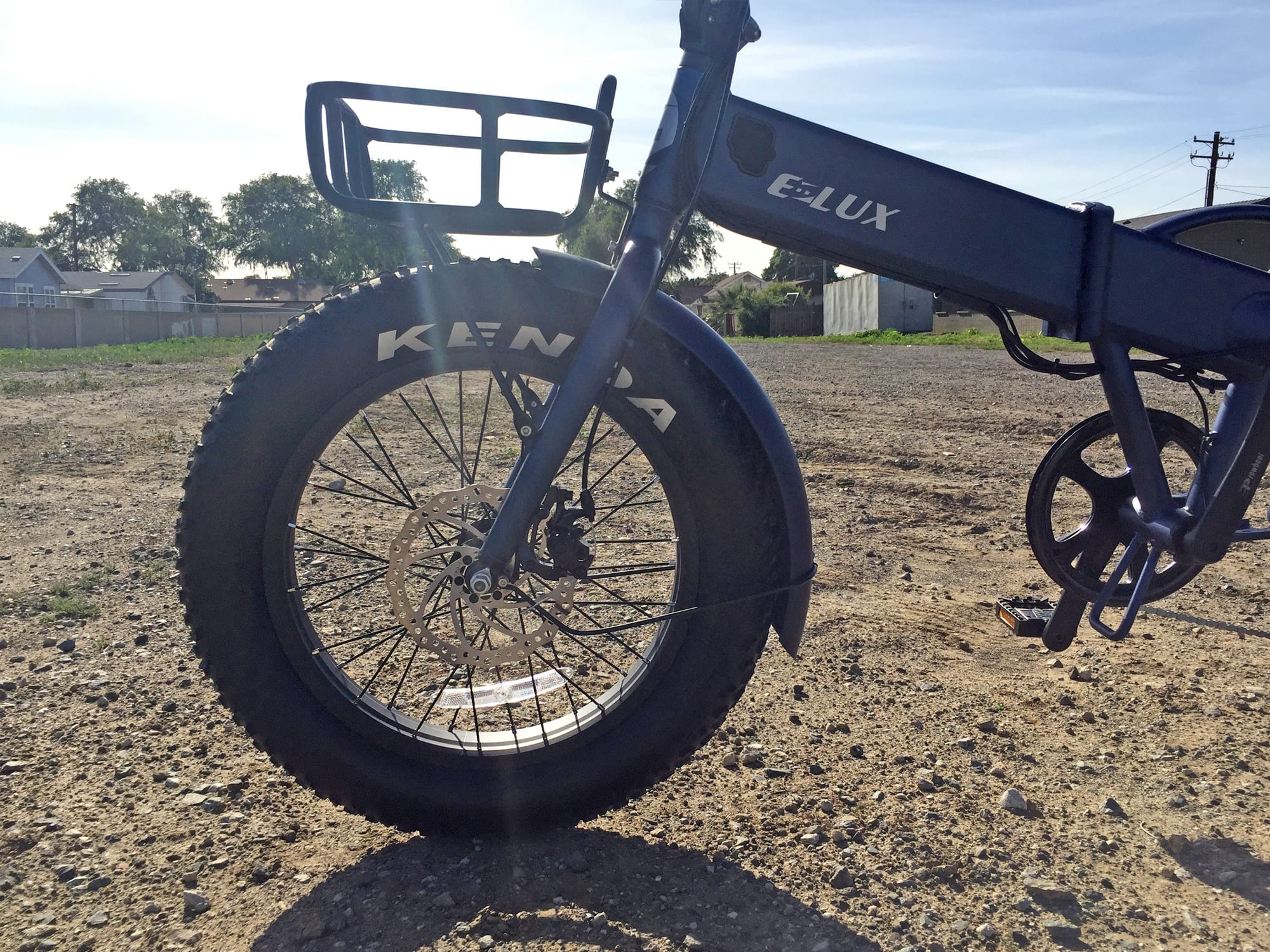
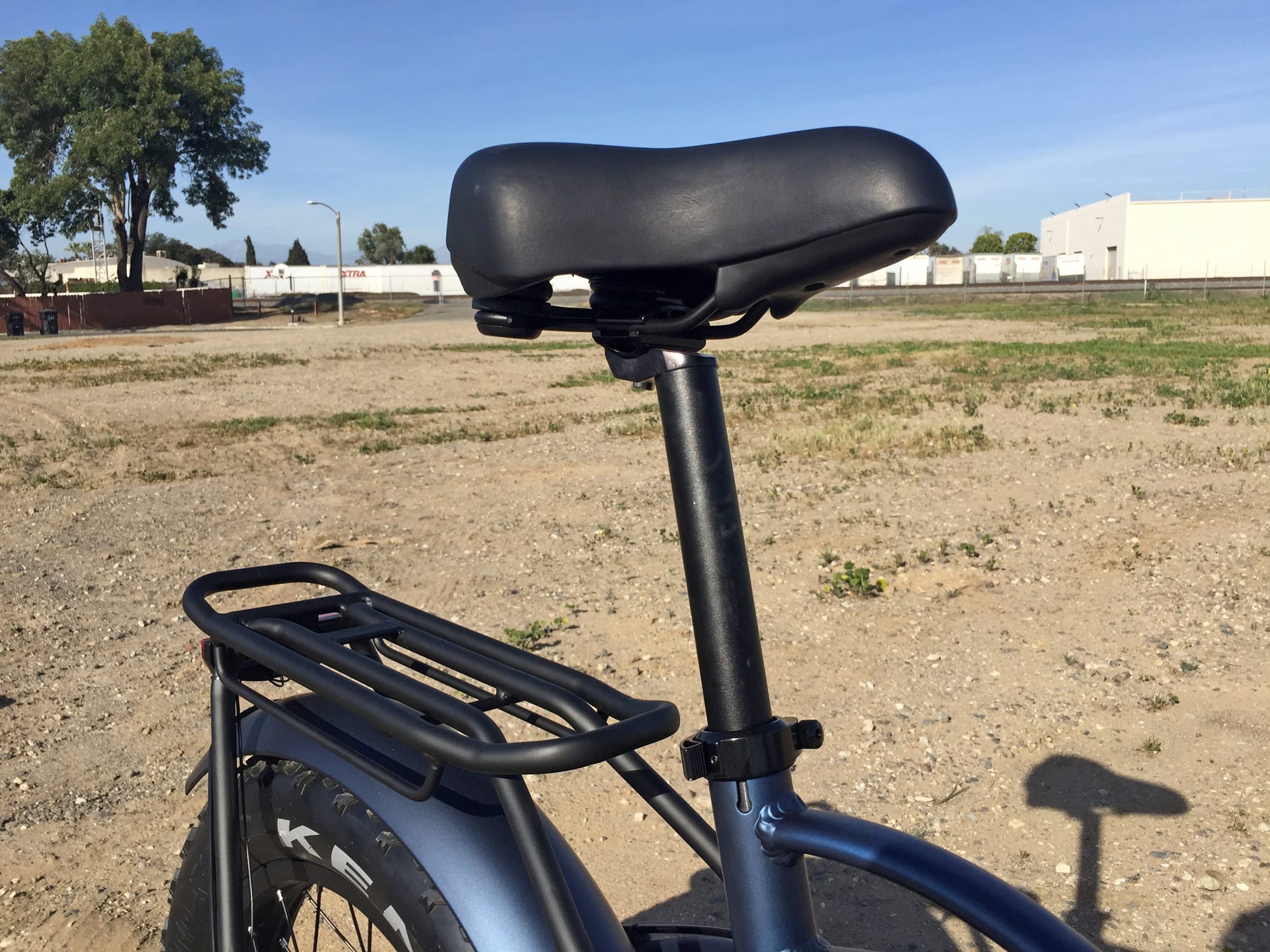
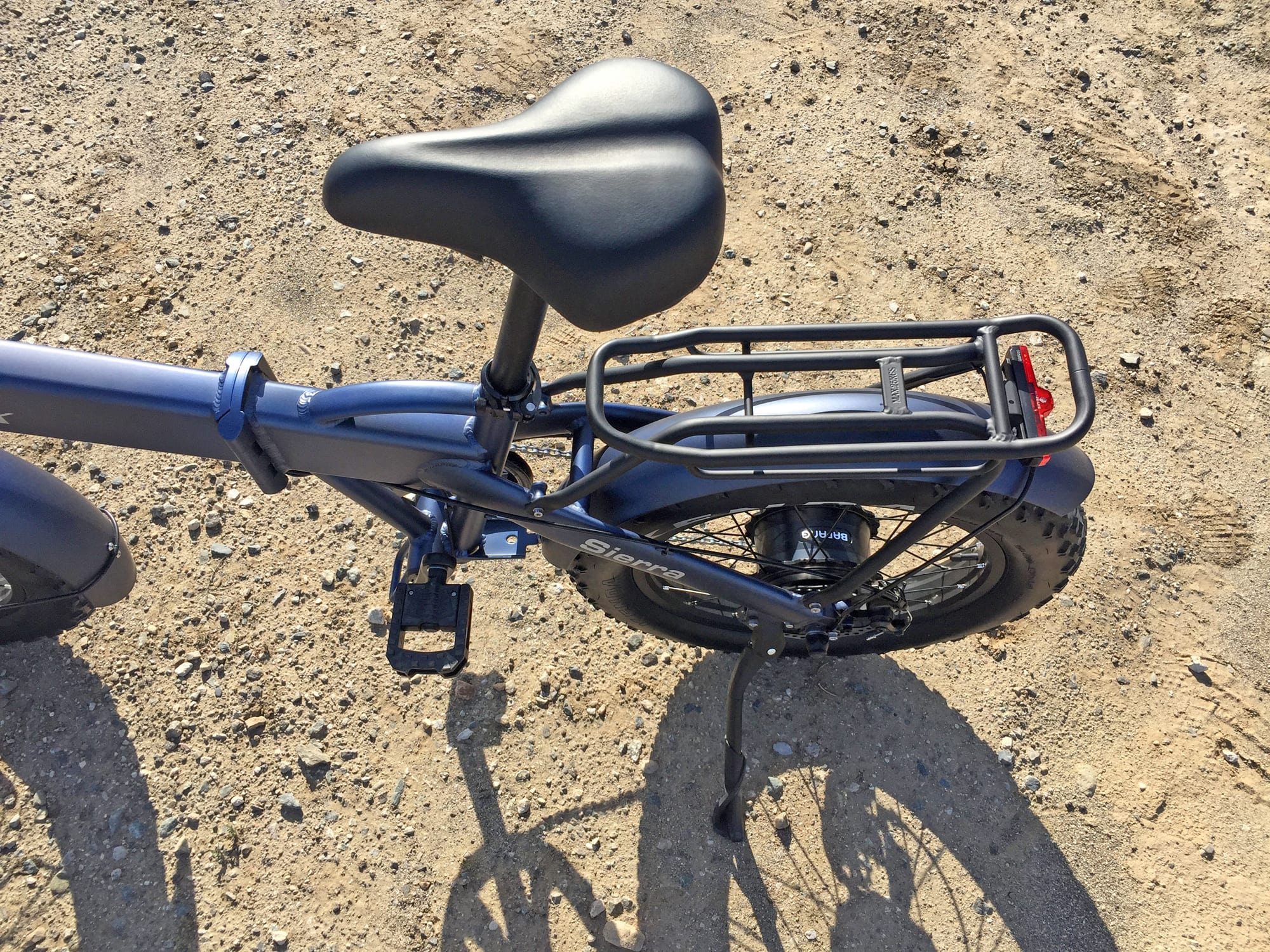
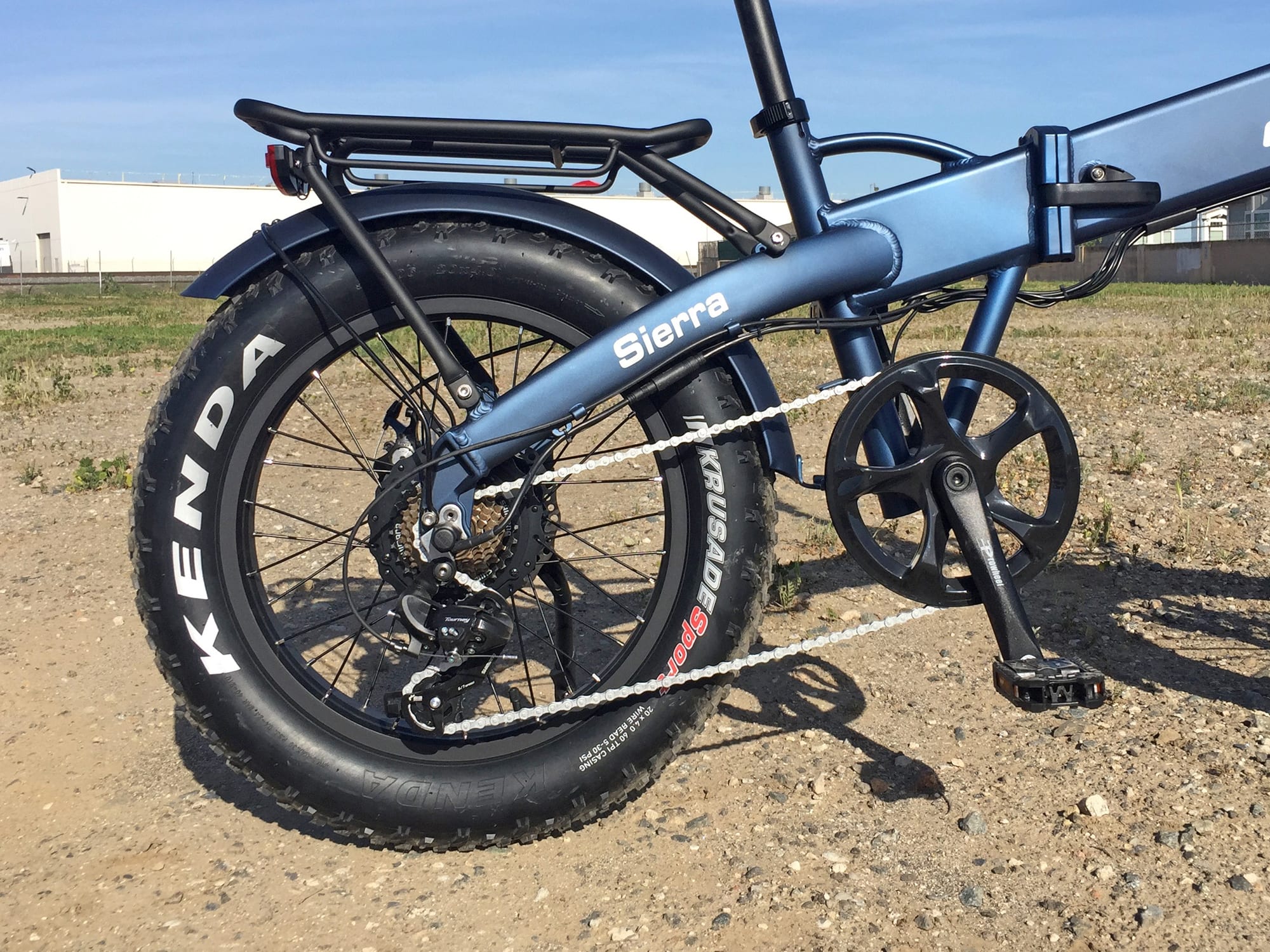
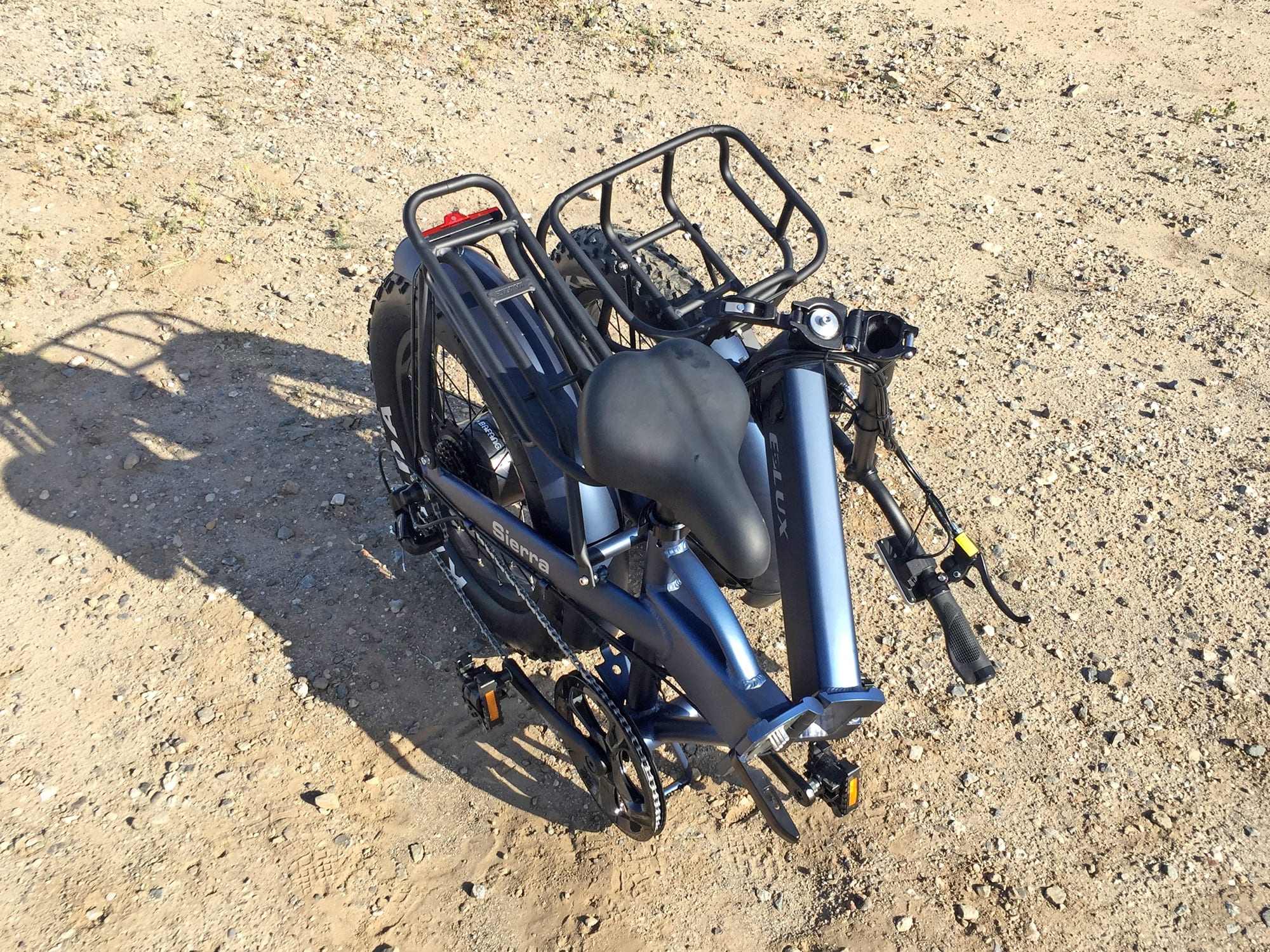
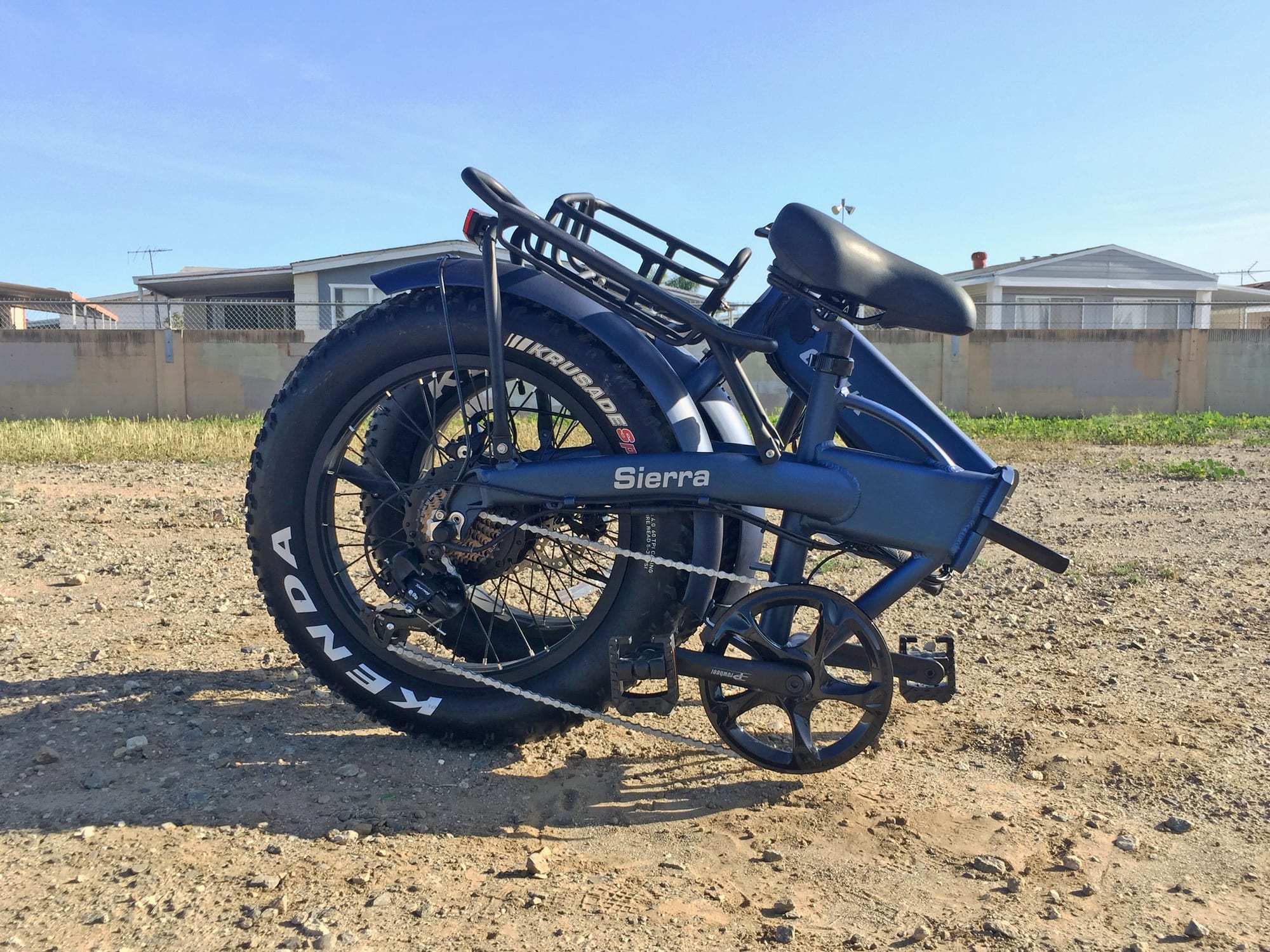
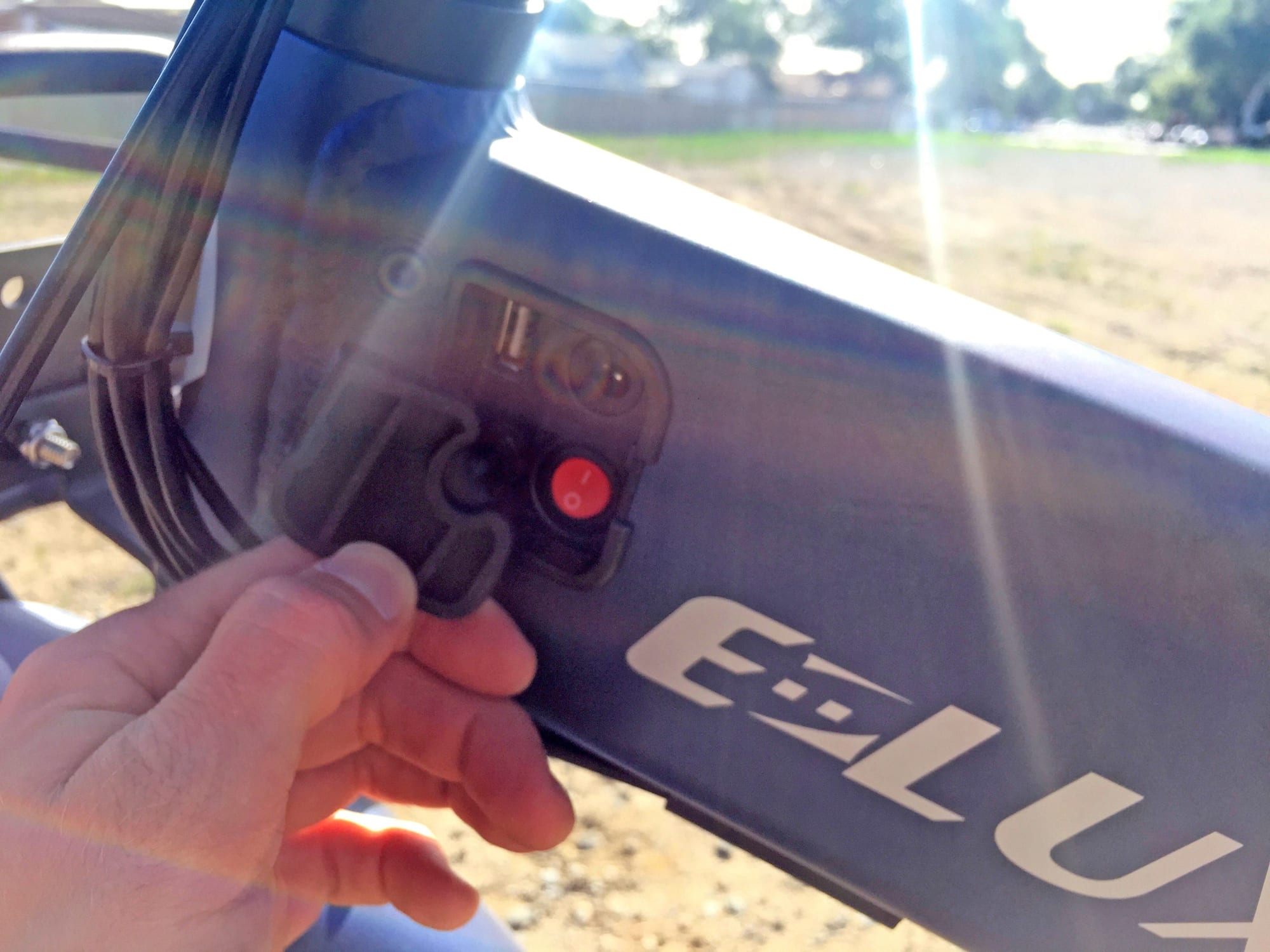
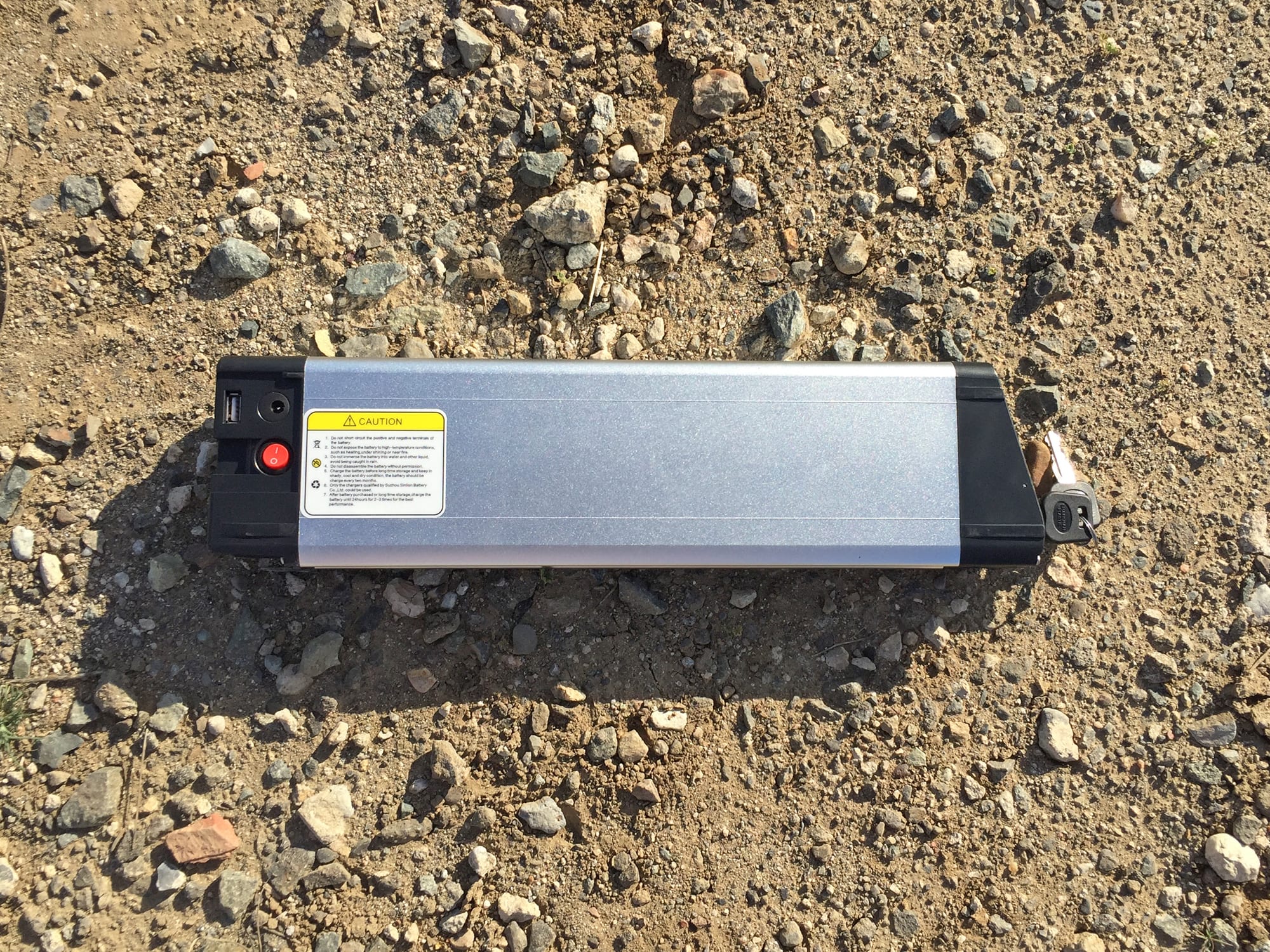
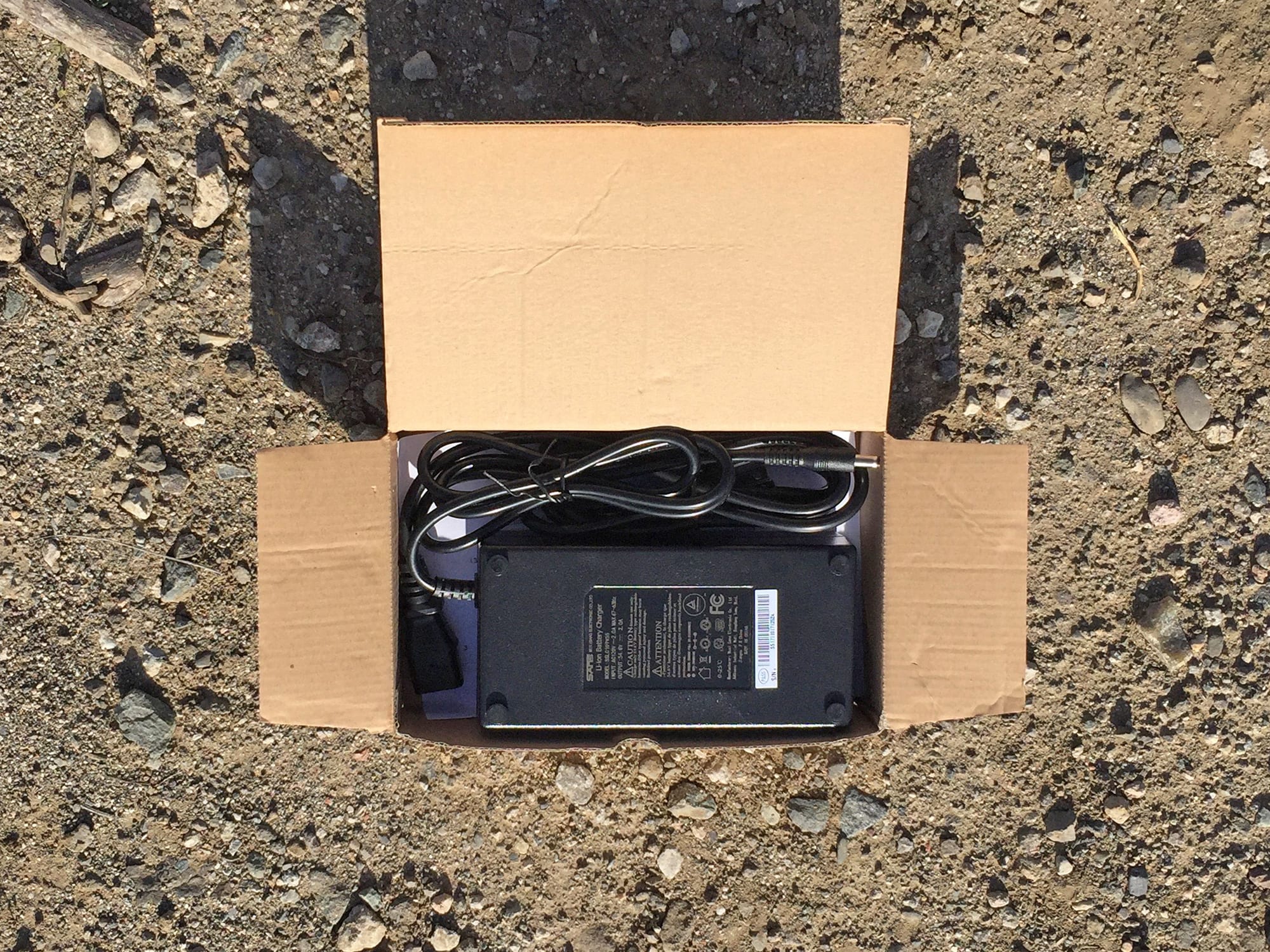


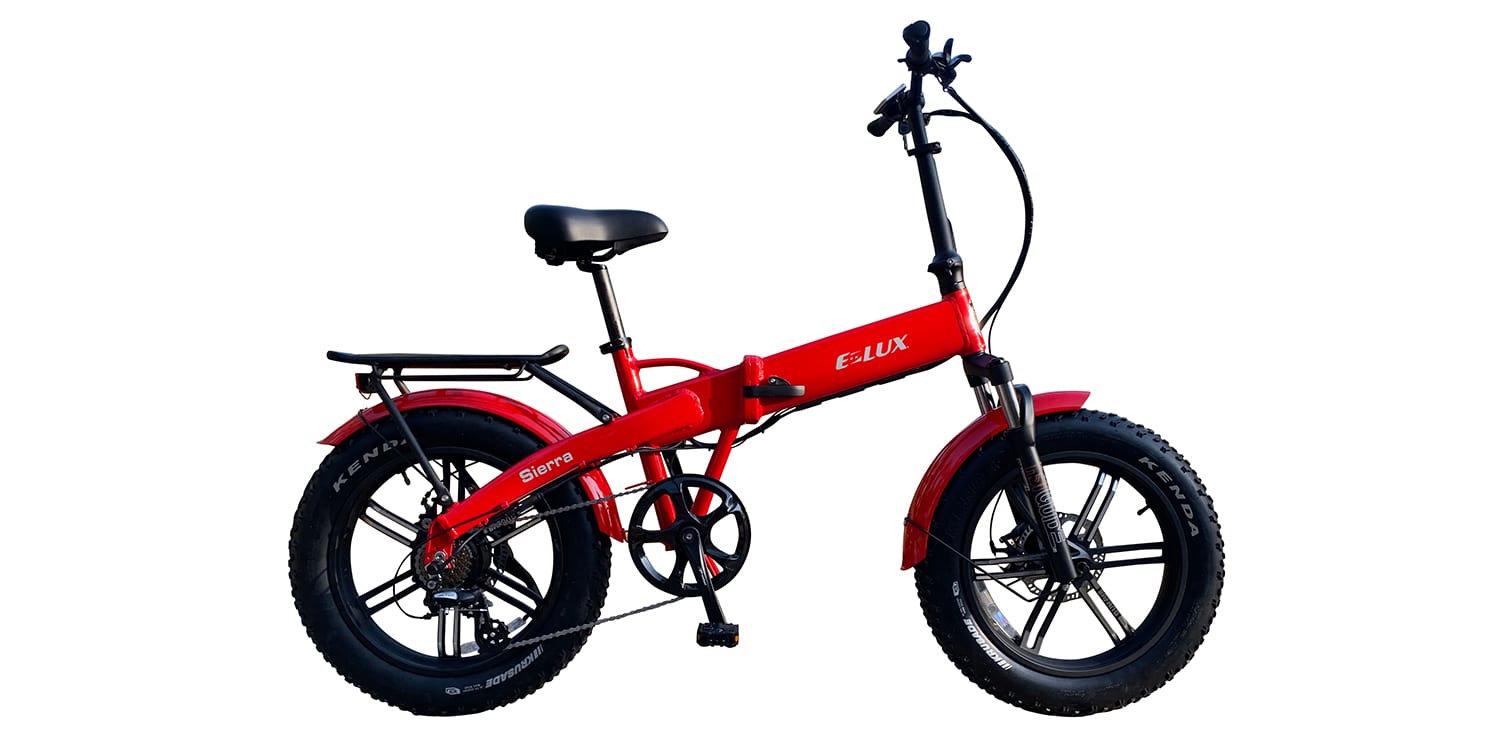
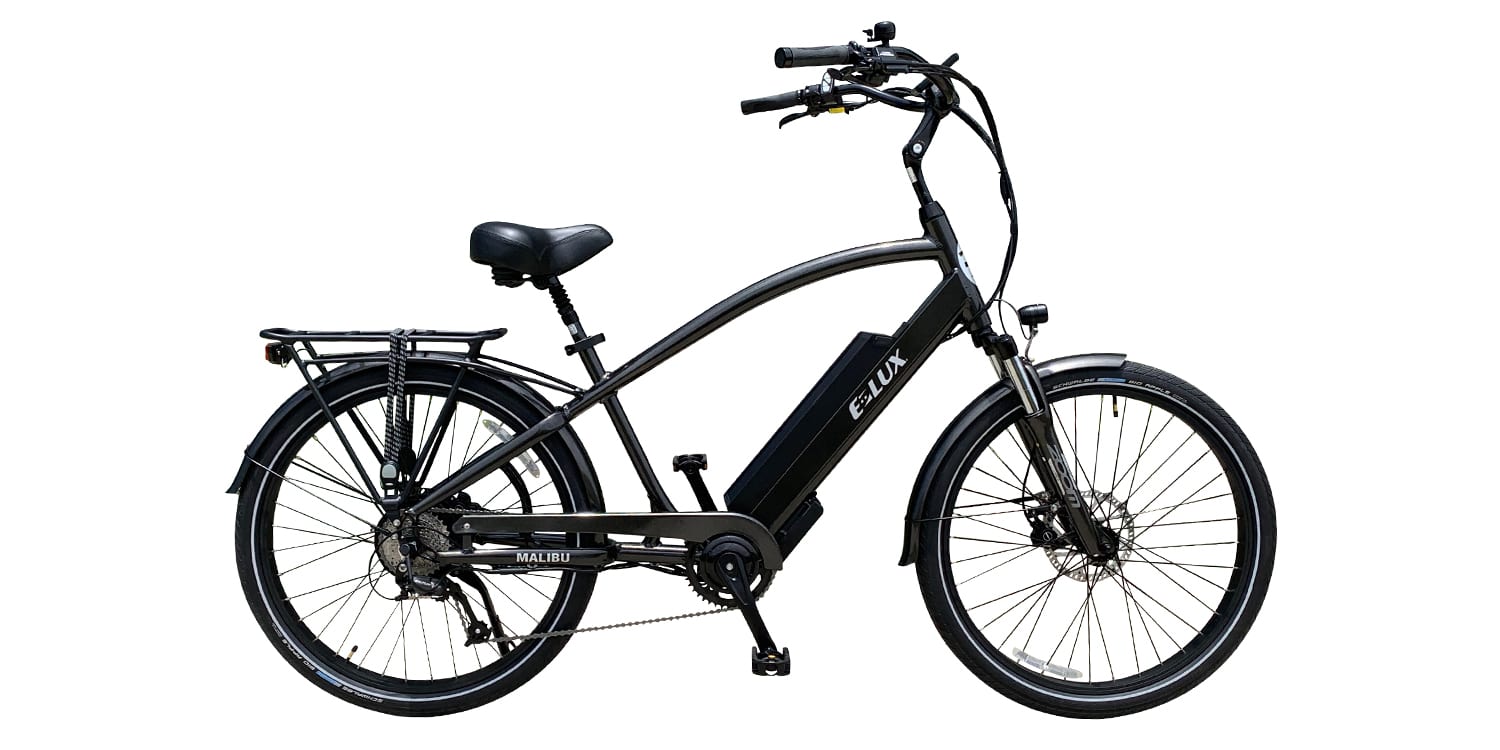
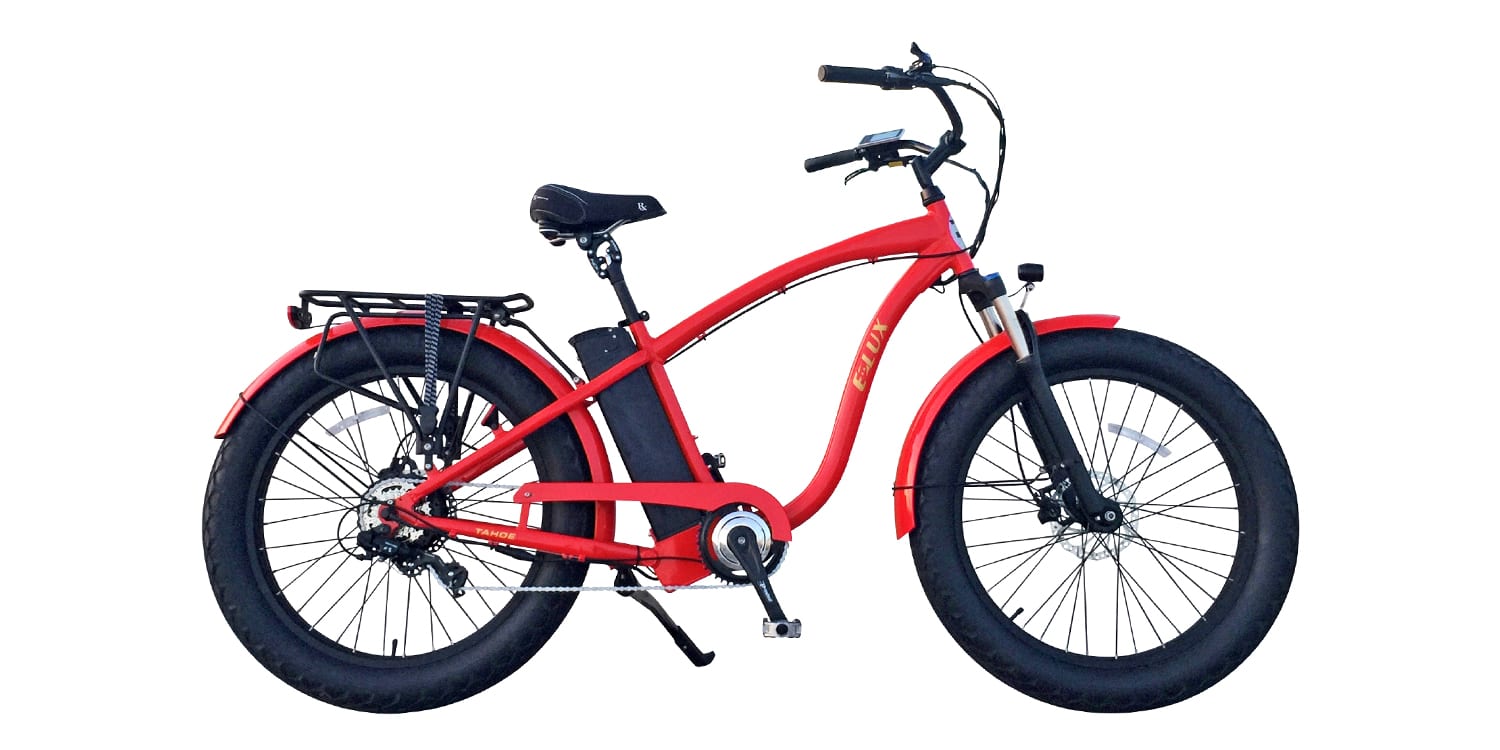
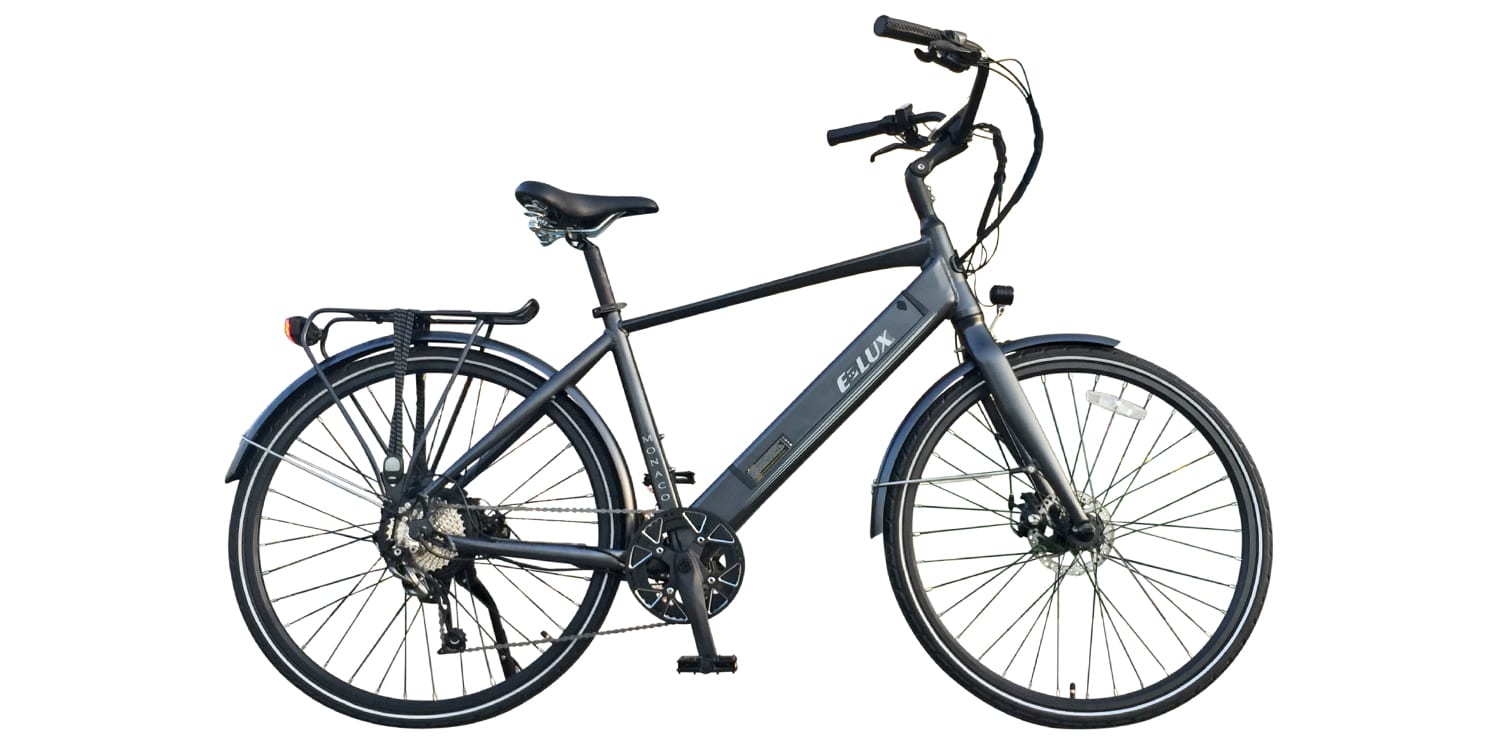
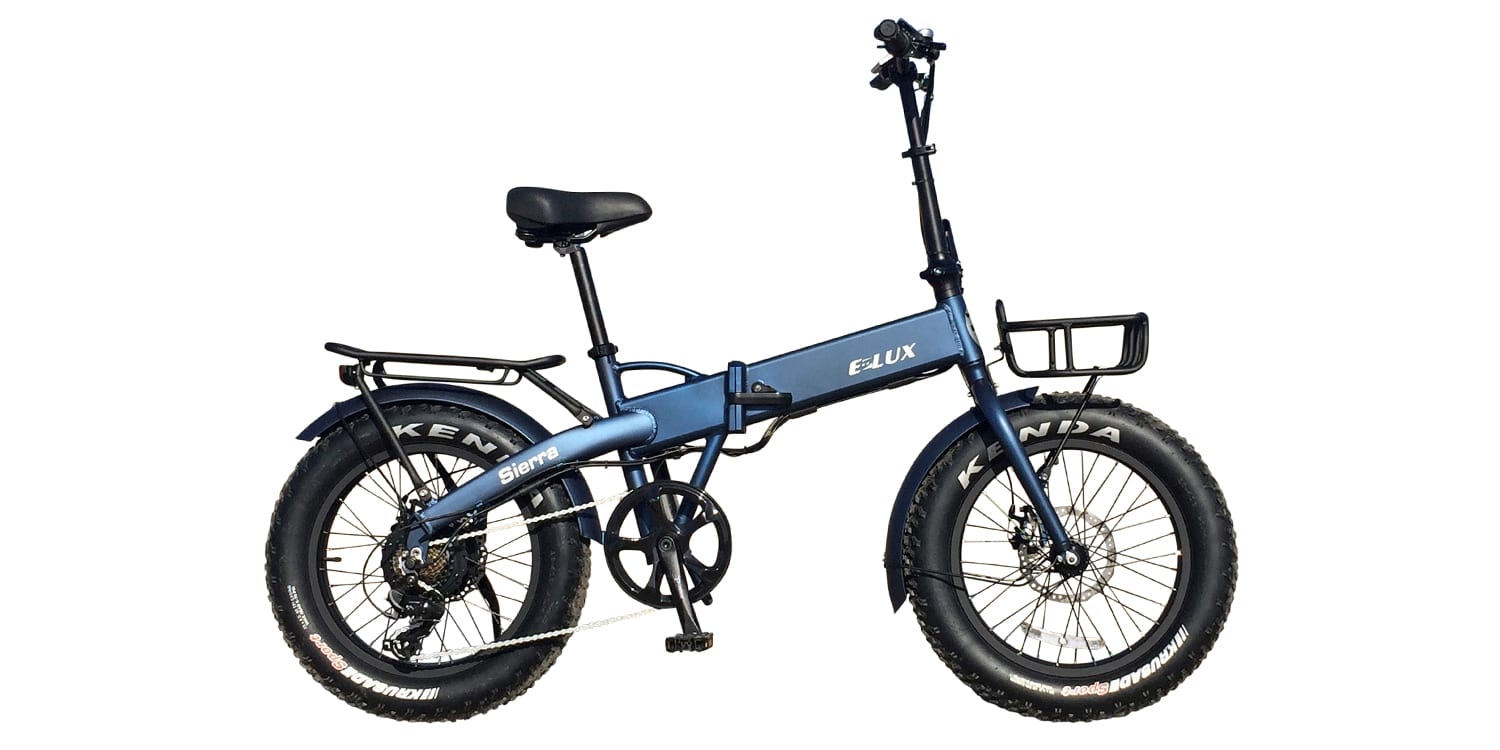

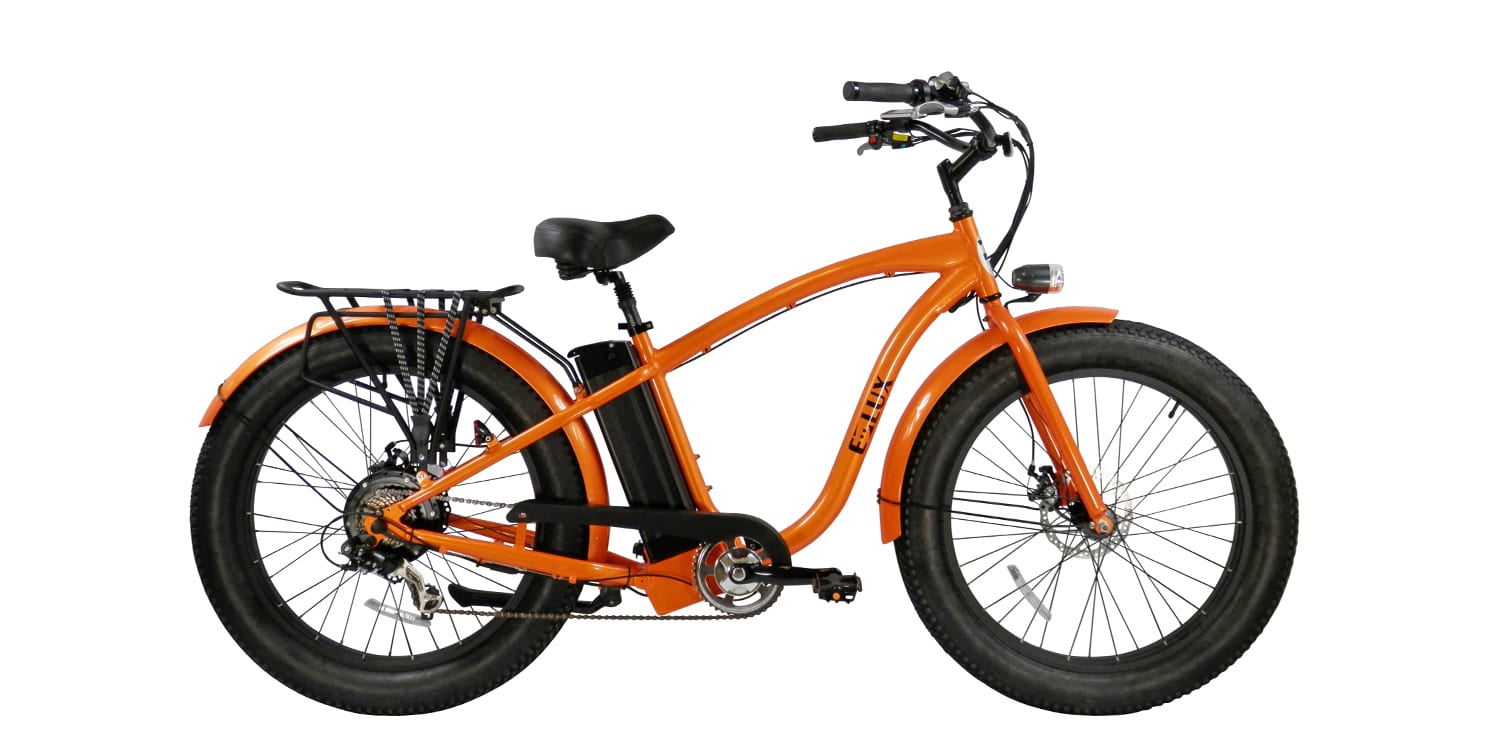
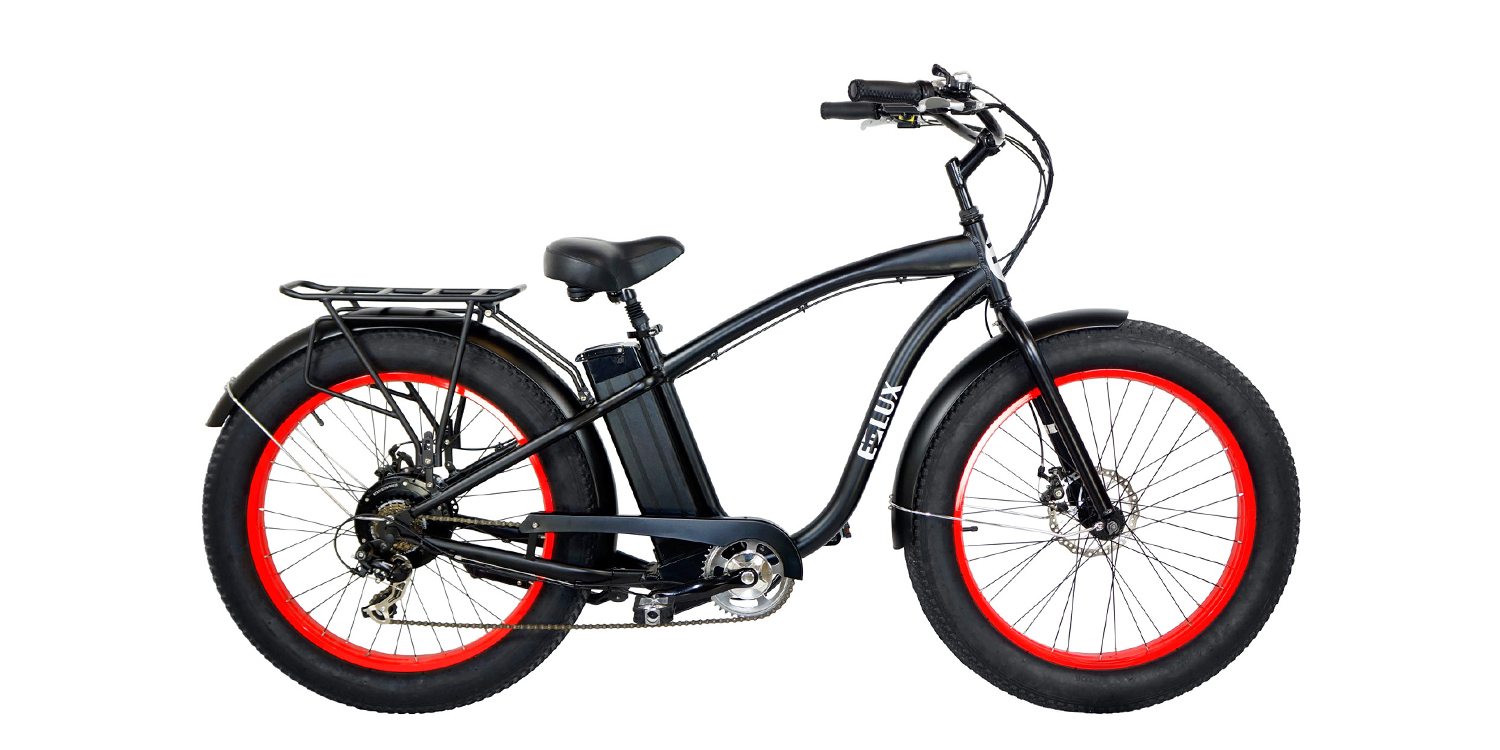
Bruce says
Even aluminum frames will oxidize when the metal is exposed to air and with any paint scratches all one needs to do is apply clear fingernnail polish ,which is lacquer, on the spot.
Court says
That’s a great tip, Bruce! I realize that Aluminum alloy can oxidize over time a bit, but I wonder if it’s as damaging as rust on steel? I got the impression that the integrity of aluminum would hold up, but it just might look a bit faded over time. Is that the only consequence that you’re aware of?
Bruce says
With steel the oxidation is called rust but all metals, even stainless, will oxidize in air. Clear lacquer that blocks the air is the best solution for exposed metals. Often what looks like bare aluminum actually has either a clear coating or has been anodized as with chainrings.
Rust actually is protective and many building have untreated steel siding that is allowed to rust for the “look”. There are paints that are ideal for bikes like Imron that has been around for more than 50 years. If repainting a bike I would use this paint. I have a bike frame that was painted with Imron in 1976 and the paint is still in perfect condition.
Court says
Wow, this is great information. Thanks for the tip about Imron paint. So what’s the deal with certain steel objects rusting through (like the rear panels on a Toyota pickup truck from the 80’s or the hitch receiver on many trucks?) It’s almost like the steel is delaminating and then chunks apart. Why does that happen and how to avoid it? This is what caused me to think that steel rusting was much more problematic than aluminum alloy oxidizing, because I haven’t seen extreme results of it first hand.